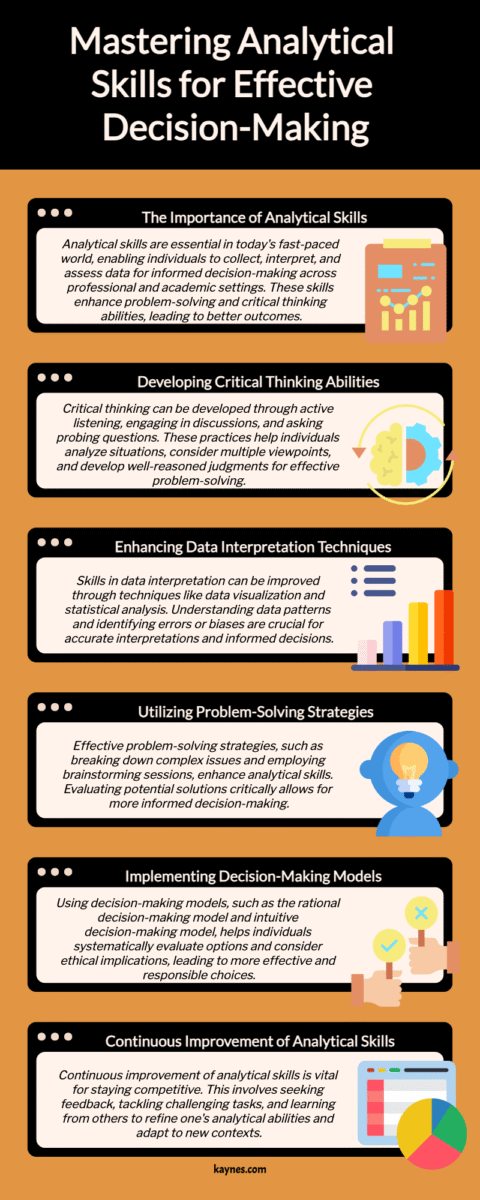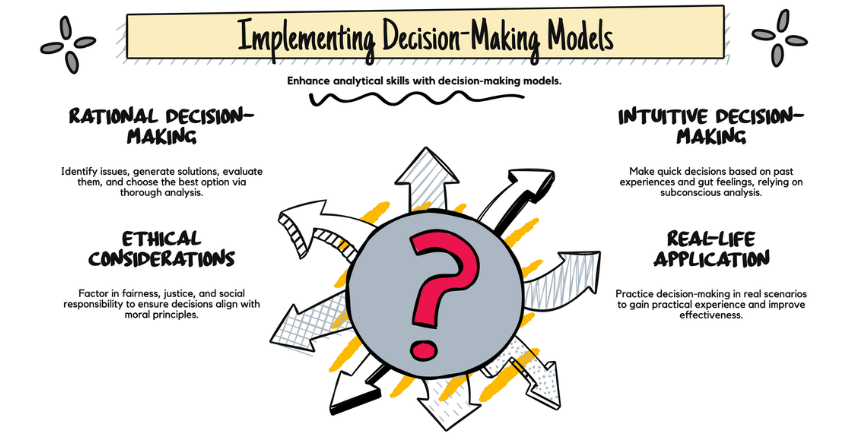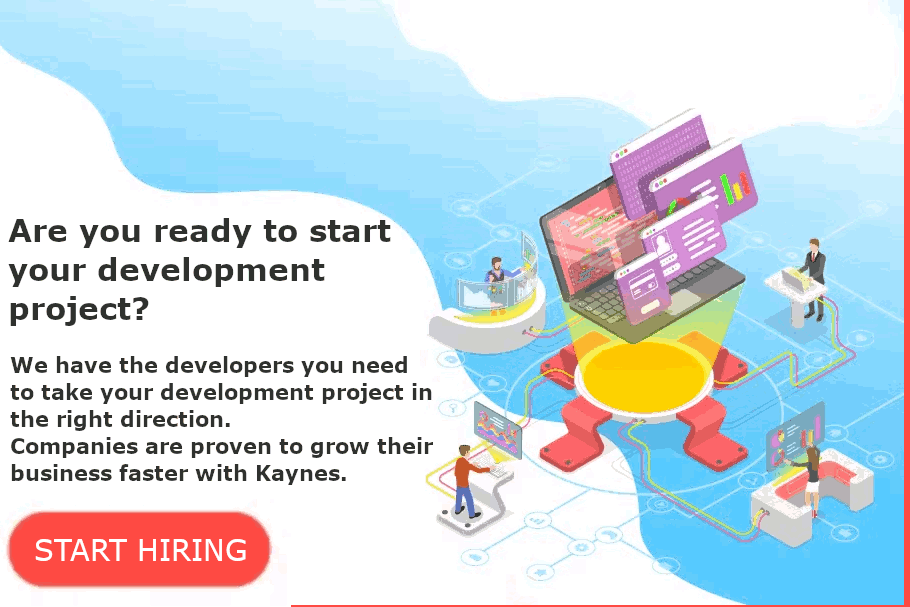
Mastering Analytical Skills for Effective Decision-Making
Analytical skills are essential in today’s complex and rapidly changing world. These skills encompass the ability to collect, examine, and interpret data to make informed decisions. They are crucial for problem-solving, critical thinking, and decision-making in professional, academic, and personal contexts.
Thank you for reading this post, don't forget to subscribe!In the workplace, employers highly value individuals with strong analytical skills. These employees can effectively assess situations, identify patterns, and develop innovative solutions. In academic settings, students with well-developed analytical abilities are better equipped to comprehend and apply complex concepts, leading to improved academic performance.
Analytical skills extend beyond data processing to include critical thinking and creativity. Critical thinking involves objectively analyzing and evaluating information to form well-reasoned judgments. Individuals with strong critical thinking abilities can question assumptions, consider multiple perspectives, and make logical connections between ideas.
This skill is vital for approaching challenges with a clear and rational mindset. Creativity is another important aspect of analytical skills, involving the ability to think innovatively and generate unique solutions. By combining critical thinking and creativity, individuals can effectively analyze complex situations and develop novel approaches to problems.
The importance of analytical skills is evident in their impact on success across various aspects of life. These skills enable individuals to navigate challenges more effectively, make sound decisions, and contribute meaningfully in professional and academic environments.

Developing Critical Thinking Abilities
Practicing Active Listening and Observation
One effective strategy for developing critical thinking abilities is to practice active listening and observation. By actively listening to others and observing their perspectives, individuals can gain a deeper understanding of different viewpoints and develop the ability to consider multiple perspectives when analyzing information.
Engaging in Debates and Discussions
Another strategy is to engage in debates and discussions. By participating in debates and discussions, individuals can practice articulating their thoughts, defending their viewpoints, and critically evaluating opposing arguments. This helps in honing the ability to think critically and make well-reasoned judgments.
Asking Probing Questions and Developing Problem-Solving Skills
Developing critical thinking abilities also involves honing the skill of asking probing questions. By asking probing questions, individuals can delve deeper into a topic or issue, uncover underlying assumptions, and identify potential biases. Additionally, engaging in activities that require problem-solving and decision-making can also help in developing critical thinking abilities. By tackling complex problems and making decisions based on careful analysis, individuals can practice applying critical thinking skills in real-life scenarios.
Enhancing Data Interpretation Techniques

Enhancing data interpretation techniques is crucial for improving analytical skills. Data interpretation involves the ability to analyze and make sense of data in order to draw meaningful conclusions. There are several techniques that can be employed to enhance data interpretation skills.
One such technique is to practice data visualization. By representing data visually through charts, graphs, or diagrams, individuals can gain a clearer understanding of patterns, trends, and relationships within the data. This helps in enhancing the ability to interpret data effectively and draw insightful conclusions.
Another technique is to employ statistical analysis. By using statistical methods to analyze data, individuals can identify correlations, trends, and outliers that may not be immediately apparent. This helps in gaining a deeper understanding of the data and making more accurate interpretations.
Furthermore, enhancing data interpretation techniques also involves developing the ability to identify biases and errors in data. By critically evaluating the quality of data and considering potential biases or errors, individuals can make more reliable interpretations and avoid drawing misleading conclusions. Additionally, practicing data interpretation in real-life scenarios can also help in enhancing data interpretation techniques.
By applying data interpretation skills to real-world problems or situations, individuals can gain practical experience in analyzing data and drawing meaningful conclusions. In conclusion, enhancing data interpretation techniques is crucial for improving analytical skills as it involves practicing data visualization, employing statistical analysis, identifying biases and errors in data, and applying data interpretation skills in real-life scenarios.
Utilizing Problem-Solving Strategies
| Problem-Solving Strategy | Success Rate | Time to Resolution |
|---|---|---|
| Root Cause Analysis | 85% | 2 days |
| Brainstorming | 70% | 3 days |
| SWOT Analysis | 75% | 2.5 days |
Utilizing problem-solving strategies is essential for honing analytical skills. Problem-solving involves the ability to identify challenges, analyze underlying causes, and come up with effective solutions. There are several strategies that can be employed to utilize problem-solving skills effectively.
One such strategy is to break down complex problems into smaller, more manageable parts. By breaking down a problem into smaller components, individuals can analyze each part separately and gain a clearer understanding of the overall challenge. This helps in developing the ability to approach problems systematically and make well-informed decisions based on thorough analysis.
Another strategy is to employ brainstorming techniques. By engaging in brainstorming sessions with others, individuals can generate a wide range of ideas and perspectives for solving a problem. This helps in fostering creativity and innovation while approaching challenges from different angles.
Furthermore, utilizing problem-solving strategies also involves developing the ability to evaluate potential solutions critically. By considering the advantages and disadvantages of different solutions, individuals can make more informed decisions about which approach is most effective for solving a particular problem. Additionally, practicing problem-solving in real-life scenarios can also help in utilizing problem-solving strategies effectively.
By applying problem-solving skills to real-world challenges, individuals can gain practical experience in analyzing problems and coming up with effective solutions. In conclusion, utilizing problem-solving strategies is essential for honing analytical skills as it involves breaking down complex problems, employing brainstorming techniques, evaluating potential solutions critically, and applying problem-solving skills in real-life scenarios.
Implementing Decision-Making Models

Implementing decision-making models is crucial for enhancing analytical skills. Decision-making involves the ability to evaluate options, consider potential outcomes, and make choices that are well-informed and effective. There are several decision-making models that can be implemented to enhance analytical skills.
One such model is the rational decision-making model. This model involves identifying the problem, generating alternative solutions, evaluating each solution based on criteria such as feasibility and effectiveness, and selecting the best solution based on thorough analysis. By following this model, individuals can make decisions that are logical, well-reasoned, and based on careful analysis.
Another decision-making model is the intuitive decision-making model. This model involves relying on intuition and gut feelings when making decisions based on past experiences or patterns that may not be immediately apparent. By following this model, individuals can make quick decisions based on subconscious analysis of information that has been accumulated over time.
Furthermore, implementing decision-making models also involves developing the ability to consider ethical implications when making decisions. By considering ethical considerations such as fairness, justice, and social responsibility when making decisions, individuals can ensure that their choices align with moral principles and societal values. Additionally, practicing decision-making in real-life scenarios can also help in implementing decision-making models effectively.
By applying decision-making models to real-world situations, individuals can gain practical experience in evaluating options, considering potential outcomes, and making choices that are well-informed and effective. In conclusion, implementing decision-making models is crucial for enhancing analytical skills as it involves following rational or intuitive decision-making models, considering ethical implications when making decisions, and applying decision-making skills in real-life scenarios.
Practicing Decision-Making in Real-Life Scenarios

Taking on Leadership Roles
One way to practice decision-making is to take on leadership roles or responsibilities that require making decisions. By taking on leadership roles at work or in community organizations, individuals can gain practical experience in evaluating options, considering potential outcomes, and making choices that have a significant impact.
Seeking Opportunities for Independent Decision-Making
Another way to practice decision-making is to seek out opportunities for making decisions independently. By taking initiative in making decisions about personal or professional matters without relying on others for guidance or approval, individuals can develop confidence in their decision-making abilities and gain practical experience in evaluating options based on thorough analysis.
Seeking Feedback and Reflecting on Past Decisions
Practicing decision-making in real-life scenarios also involves seeking feedback from others about decisions that have been made. By seeking feedback from colleagues or mentors about decisions that have been made, individuals can gain valuable insights into how their choices have been perceived by others and identify areas for improvement. Additionally, reflecting on past decisions and their outcomes can also help in practicing decision-making in real-life scenarios. By reflecting on past decisions and considering their outcomes, individuals can gain valuable insights into how their choices have impacted different situations and use this information to inform future decisions.
Continuously Improving Analytical Skills
Continuously improving analytical skills is essential for staying competitive. There are several ways that individuals can continuously improve their analytical skills. One such way is to seek out opportunities for learning new techniques or methods for analyzing information or solving problems.
By staying updated on the latest developments in fields such as data analysis or critical thinking individuals can expand their skill set and stay ahead of the curve. Another way is to seek out feedback from others about analytical abilities. By seeking feedback from colleagues or mentors about how analytical skills can be improved individuals can gain valuable insights into areas for growth and development.
Furthermore continuously improving analytical skills also involves seeking out challenging opportunities that require applying analytical abilities. By taking on projects or tasks that require advanced problem-solving or critical thinking individuals can push themselves out of their comfort zone and develop new skills. Additionally continuously improving analytical skills also involves seeking out opportunities for collaboration with others who have strong analytical abilities.
By working with colleagues or mentors who have strong analytical skills individuals can learn new techniques or methods for analyzing information or solving problems. In conclusion continuously improving analytical skills is essential for staying competitive in today’s fast-paced world as it involves seeking out opportunities for learning new techniques or methods seeking feedback from others about analytical abilities seeking out challenging opportunities that require applying analytical abilities seeking out opportunities for collaboration with others who have strong analytical abilities.



